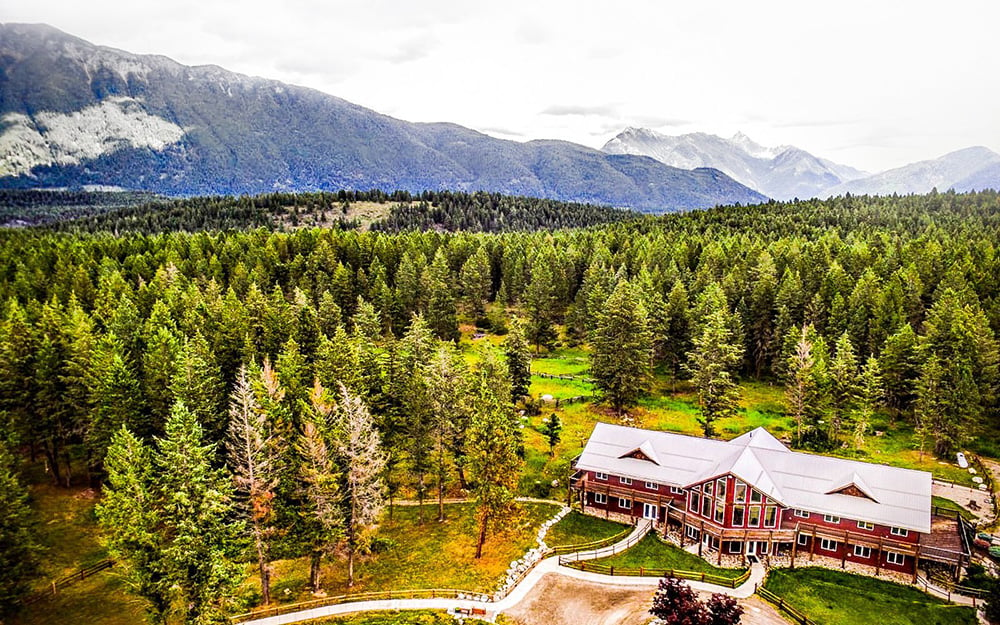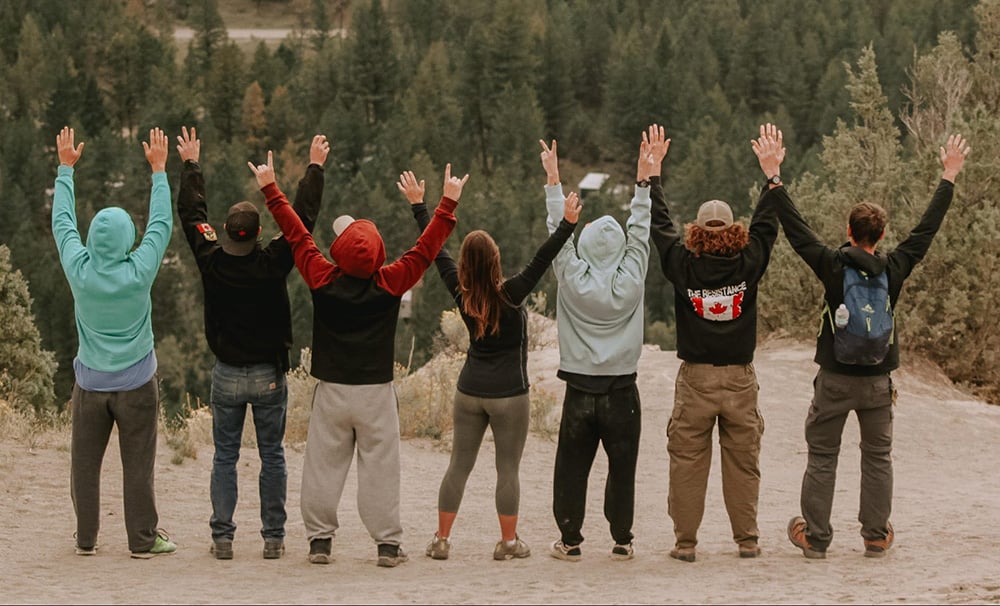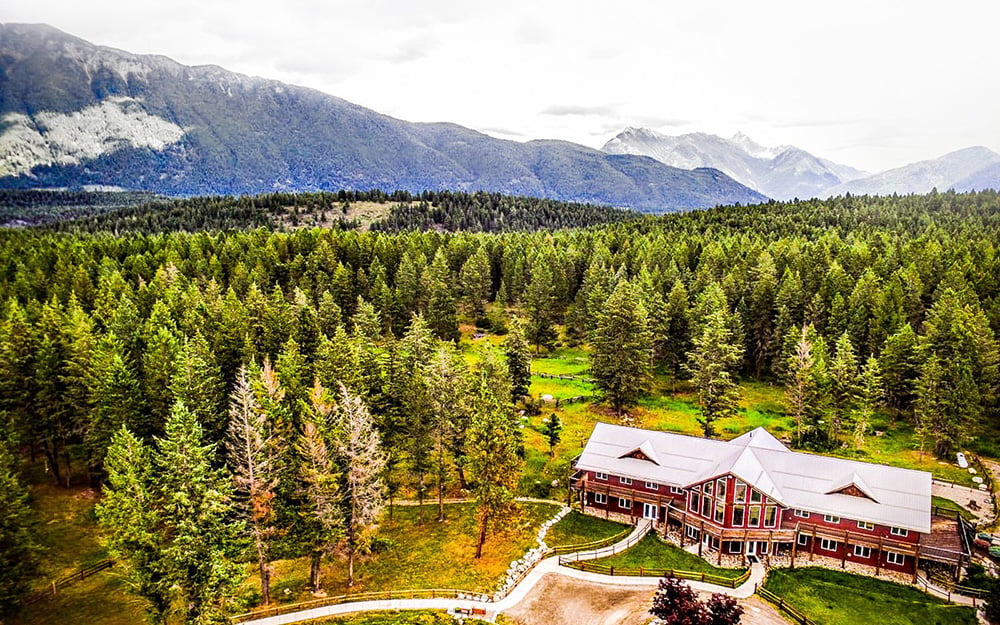EHN Edgewood Rockies
A serene addiction treatment facility in the B.C. Rocky Mountains.
Contact Us
Reach OutWe offer several confidential, no-commitment ways to learn more about our treatment centre in Fort Steele, B.C.

A Private, Secluded Addiction Treatment Centre
EHN Edgewood Rockies, formerly Recovery Ranch, is a medically supervised holistic addiction and mental health treatment centre specializing in concurrent mental health disorders. Our compassionate team provides hope and recovery to those who are often in the darkest periods of their life when they arrive.
When patients gain an understanding of their addiction and their experiences, they discover more about themselves. And on this path of discovery, they connect with a unique community of peers and expert support counselors, many of whom have had similar journeys. Together, patients at our addiction and mental health treatment facility carve a new path forward – one of wholeness, health, and hope.

With the right support, recovery is possible.
From medically supervised detox to our post-treatment plans and facilitated Aftercare Program, EHN Edgewood Rockies offers a full continuum of care to help heal the mind, body, and spirit. Our devoted team of experts, which includes physicians and psychiatrists, deliver unwavering support and deep compassion throughout each patient’s unique recovery journey.

The Right Environment for Holistic Healing
Nature has the power to heal the soul. At EHN Edgewood Rockies (not far from Calgary, Kelowna, Kamloops, Lethbridge, Medicine Hat, and Red Deer), embrace the stress-free, quiet calm while reconnecting, recovering, and growing.
Here, patients will experience the comfort of our log lodge and cabins, healthy meals, and the heartfelt dedication of our staff, all working passionately to help you on your healing journey.

Recovery for the Mind, Body, and Soul
EHN Edgewood Rockies is more than an addiction recovery centre. Our 600-acre sanctuary is nestled in between hundreds of thousands of acres of Indigenous land (Ktunaxa Nation) in British Columbia, offering every opportunity to experience the transformative and healing power of nature.
Enjoy access to a world of outdoor adventures and activities, including
- Scenic lake excursions with canoes, kayaks, and fishing gear available for use anytime
- Endless kilometres of walking, hiking, and mountain biking trails
- Forests of spruce and pine, perfect for a tranquil walk in the woods (group walks and hikes are also offered as part of our program)
- Wildlife discovery with an abundance of deer and elk in the area, as well as an array of bird species that enrich the ambiance of EHN Edgewood Rockies
- Breathtaking panoramic views of rolling hills, forests, grasslands, and hay fields complete with rustic wooden fences (eco-therapy is also included in our program)

Holistic Addiction Recovery
We also offer a fully equipped gymnasium with both free weights and cardio-vascular machines. This is included in your treatment package at no additional cost to you.
We also offer:
- An infrared sauna
- Yoga and meditation
- Equine therapy, fishing and other outdoor activities
- Registered masseuse and a reiki/reflexology (for an additional cost)

Ongoing Alumni Outreach and Support
Upon completion of treatment, one of the most important things our alumni can do to be successful in long-term recovery and sober living is to stay connected with each other. Becoming an active member of our EHN Canada Alumni Community can help to continue building those friendships, bonds, and support networks.
Our robust alumni outreach program is an integral part of our continuum of care and is offered across the entire EHN Canada network, in addition to our Aftercare services. Designed to help you maintain long-term and supportive relationships, all program graduates receive alumni outreach calls, email communications, and invitations to special events and recovery related celebrations.
EHN Edgewood Rockies Reviews
EHN Edgewood Rockies's Treatment Programs & Services
The beautiful setting and comforting atmosphere of EHN Edgewood Rockies is the perfect place to achieve recovery and begin to live a healthier and happier life. Backed by science and meticulously developed from years of research and experience, we’re constantly innovating our treatment programs to ensure we’re offering our patients the best care possible.
Amenities Offered with Our Inpatient Programs
- On-site medical professionals, including nurses available 24/7
- Evidence-based approaches including Cognitive Behavioural Therapy (CBT), Dialectical Behavioural Therapy (DBT), Equine Therapy, Motivational Interviewing and Ecotherapy
- Access to staff psychiatrists
- Individual counselling and small group therapy
- Integrated care that include yoga, meditation and fitness
- Access to peer support groups, like Alcoholics Anonymous, SMART Recovery, and Dharma/Refuge recovery groups during and after treatment
- Aftercare programming
- Ongoing Alumni Outreach Program through the EHN Canada Alumni Community
Learn More about EHN Edgewood Rockies
How Treatment at EHN Edgewood Rockies Works
Pre-Screening Assessment
Chat with one of our admissions coordinators to find the treatment program that is the best fit for you.
Care Plan
Meet with our team to create your treatment plan.
Detox & Stabilization
If necessary, prepare for rehab in a safe, medically supervised environment.
Treatment
Spend six weeks healing your mind, body and spirit at EHN Edgewood Rockies.
Aftercare and Ongoing Alumni Outreach
Leave EHN Edgewood Rockies with a relapse-prevention plan, and receive ongoing alumni outreach along with regular Afterare group sessions to support continued sober living.
Frequently Asked Questions
-
What type of addictions are treated at EHN Edgewood Rockies? What if I have multiple addictive behaviours or concurrent mental health issues?
The dedicated clinical professionals at EHN Edgewood Rockies have designed a program that is both effective and specially tailored to address a diverse range of addiction challenges. Although we focus primarily on substance addictions (i.e., alcohol and drugs), our program can also concurrently address behavioural addictions such as gambling, sex, and love addiction, as well as other dependencies. Our program also recognizes that there are often concurrent mental health disorders that accompany addictions, such as depression, trauma, anxiety, and ADHD.
-
How does EHN Edgewood Rockies determine the best treatment approach?
Upon admission, a full evaluation is conducted using a biopsychosocial interview. If necessary, additional follow-up screenings or assessment tools (e.g., the Addiction Severity Index, Substance Abuse Subtle Screening Inventory) are used to further guide our evaluation process.
-
What methods of treatment are used at EHN Edgewood Rockies?
The intensive and comprehensive nature of our services sets EHN Edgewood Rockies apart.
Treatment at EHN Edgewood Rockies is provided by fully trained professionals who work as a multidisciplinary team that follows a holistic approach. Because everyone experiences addiction in different ways, we function on a case managed basis, where a professional counsellor works with each client to ensure that their specific, unique and individual recovery needs are being met.
Our counsellors provide individual and group counselling, as well as group psychoeducational counselling. Clients participate in informative seminars and take classes on the nature of addiction. They also receive self-reflective assignments and self-care techniques to practice. We emphasize relapse prevention and recovery strategies, healthy lifestyle development, a balanced reintegration into recovery, and the importance of social support. We also encourage engagement in work and/or volunteer activities, physical activity and stress management, healthy eating, meditation and mindfulness practice, and an appreciation for the healing qualities of nature.
We offer a variety of evidence-based treatments and addiction counselling techniques, including:
- Cognitive Behavioural Therapy (CBT) to assist in developing helpful thought patterns and healthy behaviours in recovery
- Dialectical Behavioural Therapy (DBT) for developing the skills needed to manage emotions and relationships, practice mindfulness, and survive crises
- An abstinence-based approach, combined with medication assistance therapy if needed
- Individual psychotherapy
- Group therapy
- Psychoeducational group sessions
- Mindfulness and physical exercise
- Relapse prevention groups
-
Do you have a family program?
Yes, our Family Education Workshops take place virtually and are designed to provide a safe space for loved ones of those in treatment to learn effective strategies for understanding, managing, and coping with chronic illnesses. Sessions will be focused on general information that family members can implement, where appropriate and relevant.
-
What is the weather like?
Here in the East Kootenay Valley, we’re fortunate enough to experience all four seasons of weather and a lot of sunshine throughout. In fact, our area is on the list of locations that boast the most hours of sunshine in Canada.
Situated in a relatively dry region at an elevation of 3000 feet above sea level, we typically don’t experience the extreme cold associated with higher mountain living. The summers are a delightful blend of sunshine, warmth, and dry weather, making for a beautiful backdrop. Autumn brings mild and comfortable temperatures, while migratory birds begin their journey. Winters, while cool, remain calm and peaceful due to the dry climate and minimal wind. The fireplace in our great room becomes a cozy focal point during this season, offering the perfect spot to relax and read some inspiring literature. Spring is also a favourite with flowers blooming as we anticipate the return of the migratory birds.
Each season brings its own unique charm to EHN Edgewood Rockies , which overlooks Kimberly Alpine Ski resort. Many have even marveled at the fact that you can enjoy both mountain biking along the scenic trails, as well as skiing on the slopes in the very same day. And because of our unwavering commitment to year-round outdoor activities, there’s never an unpleasant time to experience the serenity of EHN Edgewood Rockies .
Note that while a referral is not necessary for admission to our program, for your own benefit we highly recommend that incoming clients obtain a referral letter from a medical practitioner indicating a diagnosis of addiction, and a recommendation of detoxification and/or residential treatment. Our past clients have found this useful when it comes time to file their tax returns. Upon discharge from our program, EHN Edgewood Rockies will supply our clients with receipts, and a letter which confirms dates of attendance, the cost of treatment, and the name of both client and payor.
-
Do I need a referral to access this program?
EHN Edgewood Rockies does not require a referral. Instead, potential patients are required to complete a comprehensive admissions application form, as we place significant importance on ensuring a “good fit” between a patient, their treatment needs, and our program.
As part of this process, we often spend time following up the information that is captured on the Admission Information Record. An Intake Coordinator, Nurse, or Clinical Director may follow up to gather additional information, clarify client needs, and answer questions they may have about our program.
In addition, clients with complex medical conditions, or those currently undergoing treatment for substance abuse or mental health conditions, may be asked to provide additional information prior to an admission decision.
Please note that while a referral is not necessary for admission into our program, we highly recommend that incoming clients obtain a referral letter from a medical practitioner indicating a diagnosis of addiction, and a recommendation of detoxification and/or residential treatment. Our past clients have found this incredibly useful when it comes time to file their tax returns. Upon discharge from our program, EHN Edgewood Rockies will supply clients with receipts, as well as a letter confirming the dates of attendance, cost of treatment, and names of both client and payor.
-
How secure is the facility?
The facility is relatively secure in that it is protected from urban activity by distance and remoteness, however it is not a locked facility. Clients are not permitted to leave the facility during their treatment unless they are accompanied by EHN Edgewood Rockies personnel. Unauthorized visitors are not permitted on the property. This protective measure prioritizes the safety of every client and increase the likelihood that everyone can achieve their recovery goals successfully.
All EHN Edgewood Rockies personnel are committed to the rigorous confidentiality policy of the facility. Patients identities may be exposed to fellow patients who are bound by a written contract to respect everyone’s privacy. We ensure the highest possible level of discretion and respect for client privacy.
Clients cannot leave unless accompanied at any time during their stay.
-
Do patients need spending money?
All extra or adjunctive services that take place on EHN Edgewood Rockies – including massage, reiki, store purchases etc. – will be charged against the $750 pre-payment, and any charges beyond that amount will be charged to the credit card we have on file.
For expenses such as off-site store purchases or off-site services, patients will need appropriate funds. If you require a cash advance from EHN Edgewood Rockies using the credit card we have on file, you will be charged a 3% surcharge to cover our transaction fees. It is best to bring any spending money with you that you feel you may need during your stay.
We do provide secure storage where personal belongings that require safe keeping (wallet, purse, keys, etc.) will be locked away in your storage box here at EHN Edgewood Rockies .
-
Do patients have a private room?
EHN Edgewood Rockies’ accommodations are two bedroom cabins and suites in the main lodge. Accommodations can be made on a case-by-case basis. Suite-mates may change over the course of your treatment, but we discourage soloing in a suite, as addiction often results in dysfunctional social isolation. The suite-mate system aims to provide appropriate access to others in recovery for support and stabilization.
-
Is drug testing done at EHN Edgewood Rockies?
EHN Edgewood Rockies has provisions in place for testing both blood and urine. During the admission process, patients will be required to consent to random testing for drug and alcohol use. The use of drugs and alcohol is strictly prohibited throughout the duration of the treatment program. Any use of drugs or alcohol during treatment will result in immediate dismissal.
-
Can patients take prescribed medication while in treatment?
All prescriptions must be pre-approved by an EHN Edgewood Rockies Nurse in consultation with a physician, which may also involve a primary care physician. Medications will be in a personal safe that is accessible only under supervision of the clinical staff. No prescription, over-the-counter medications, herbal remedies, or supplements are allowed to be in your direct possession while in treatment.
-
Do patients have free time to themselves?
Yes, during their time here, patients’ primary focus will be on themselves and their treatment program, and that includes ensuring that they have the opportunity to nurture themselves through reflection, meditation, prayer, creative and outdoor activities, exercise, or simply relaxing.
To ensure the safety of all clients, we ask that patients cooperate with program staff at all times. The structure of our programs is purposefully intense and closely supervised to provide the structure and support to heal. Within this routine, there are plenty of opportunities for socializing or enjoying leisure activities.
-
Is it a mixed-gender/co-ed program? Are there gender-specific sessions?
Our program is inclusive, with mixed-genders and mostly co-ed activities. Some group counselling sessions are exclusive for male or female clients to ensure tailored support. All members of our dedicated personnel are highly attuned to any potential discomfort that may arise in a mixed-gender environment.
At EHN Edgewood Rockies , we purposefully cultivate a social environment that closely resembles everyday life. This intentional approach is designed to prepare alumni for the real world and the typical stresses they may encounter post-treatment. EHN Edgewood Rockies also emphasizes the importance of safe and respectful personal boundaries, along with healthy relationships both inside and outside of treatment.
-
Should patients who do not feel like they have an addiction or were pressured into treatment enroll at EHN Edgewood Rockies?
If a patient is not fully committed to treatment, feel it’s unnecessary, is not prepared for the challenging journey of recovery, or isonly looking to satisfy others, our program may not be the best fit.
Our staff is not equipped in aversion therapy and we are not a confrontational or “in your face” kind of treatment centre. Our program is built upon mutual respect, trust in the recovery process, guidance, instruction, compassion, and evidence-based therapies and counseling. More aggressive methods do exist and if this is what you are looking for, other treatment centres may be better equipped to meet your needs.
-
What determines a loan approval?
Medicard looks at a) credit history, b) ability to pay, c) employment.
-
Can a patient apply with a co-signor?
Yes. Simply ask the co-signor to complete the relevant section of the application form and fax it to Medicard.
-
What if a patient applies for financing and decides to pay for treatment through other means?
No problem. Simply inform us of the preferred method of payment.
-
Can a patient repay the loan before the end of the term?
Yes, you can repay the loan at any time without penalty.


